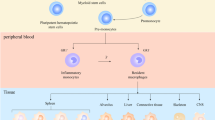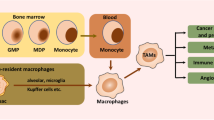Abstract
Purpose
Tumor-associated macrophages (TAM) may participate to antitumor activity of anti-HER2-targeted therapies (Pertuzumab, Trastuzumab) in breast cancers harbouring HER-2 overexpression through antibody-dependent phagocytosis. Additive antitumor effect of concurrent cytotoxic chemotherapies, including Paclitaxel, may be counterbalanced by alteration in TAM infiltrate. The aim of this study is to evaluate the role of TAM in tumor response to anti-HER2-targeted therapies and chemotherapy in an experimental model of HER2-amplified breast cancer.
Methods
A xenograft mouse model was built by subcutaneous injection of the SKBR-3 human HER2-amplified breast cancer cell line in Hu-CD34+ mice. Animals were randomized to receive weekly administration of Cremophor (control), Trastuzumab+Pertuzumab (TP), and Paclitaxel+Trastuzumab+Pertuzumab (PTP) with or without macrophage depletion with clodronate (C). At week 4, mice were euthanised and tumors were harvested for immunohistochemical analysis of TAM infiltration (RBP-J CD163 and CD68 for M1, M2, and overall TAM, respectively).
Results
Tumor size was significantly lower in mice treated with TP, PTP, and PTP+C as compared to control, while no meaningful difference was observed in the TP+C arm. Analysis of TAM infiltrate showed significantly lower CD68 and CD163 expression in PTP, TP+C, and PTP+C as compared to TP and control arm. RBP-J expression was significantly decreased in mice treated with clodronate depletion.
Conclusions
Activity of TP is modulated by TAM infiltrate, that is inhibited by concurrent administration of Paclitaxel. To enhance the effect of anti-HER2-targeted therapies and minimize chemotherapy-related side effects, modulation of TAM should be considered in novel therapeutic combinations.



Similar content being viewed by others
Data availability
The data that support the findings of this study are available from the corresponding author upon reasonable request.
Abbreviations
- ADCC:
-
Antibody Dependent Cell Cytotoxicity
- ADCP:
-
Antibody-dependent cellular phagocytosis
- C:
-
Clodronate
- HLA:
-
Human leukocyte antigen
- hu-CD34:
-
Human CD34 + hematopoietic stem cells
- NK:
-
Natural Killer
- null:
-
NOD-SCID IL2rgamma
- PTP:
-
Paclitaxel combined with trastuzumab and pertuzumab
- TP:
-
Trastuzumab with pertuzumab
- TILs:
-
T-lymphocytes
- TAMs:
-
Tumor-associated macrophages
References
Seidman AD, Fornier MN, Esteva FJ, et al. Weekly trastuzumab and paclitaxel therapy for metastatic breast cancer with analysis of efficacy by HER2 immunophenotype and gene amplification. J Clin Oncol. 2001;19(10):2587–95. https://doi.org/10.1200/JCO.2001.19.10.2587.
Agus DB, Gordon MS, Taylor C, et al. Phase I clinical study of pertuzumab, a novel HER dimerization inhibitor, in patients with advanced cancer. J Clin Oncol. 2005;23(11):2534–43. https://doi.org/10.1200/JCO.2005.03.184.
Baselga J, Cortés J, Kim SB, et al. Pertuzumab plus trastuzumab plus docetaxel for metastatic breast cancer. N Engl J Med. 2012;366(2):109–19. https://doi.org/10.1056/NEJMoa1113216.
Ali HR, Provenzano E, Dawson SJ, et al. Association between CD8+ T-cell infiltration and breast cancer survival in 12,439 patients. Ann Oncol. 2014;25(8):1536–43. https://doi.org/10.1093/annonc/mdu191.
Denkert C, von Minckwitz G, Darb-Esfahani S, et al. Tumour-infiltrating lymphocytes and prognosis in different subtypes of breast cancer: a pooled analysis of 3771 patients treated with neoadjuvant therapy. Lancet Oncol. 2018;19(1):40–50. https://doi.org/10.1016/S1470-2045(17)30904-X.
Allavena P, Sica A, Solinas G, Porta C, Mantovani A. The inflammatory micro-environment in tumor progression: the role of tumor-associated macrophages. Crit Rev Oncol Hematol. 2008;66(1):1–9. https://doi.org/10.1016/j.critrevonc.2007.07.004.
Qian BZ, Pollard JW. Macrophage diversity enhances tumor progression and metastasis. Cell. 2010;141(1):39–51. https://doi.org/10.1016/j.cell.2010.03.014.
Ahn GO, Tseng D, Liao CH, Dorie MJ, Czechowicz A, Brown JM. Inhibition of Mac-1 (CD11b/CD18) enhances tumor response to radiation by reducing myeloid cell recruitment. Proc Natl Acad Sci USA. 2010;107(18):8363–8. https://doi.org/10.1073/pnas.0911378107.
Weizman N, Krelin Y, Shabtay-Orbach A, et al. Macrophages mediate gemcitabine resistance of pancreatic adenocarcinoma by upregulating cytidine deaminase. Oncogene. 2014;33(29):3812–9.
Dijkgraaf EM, Heusinkveld M, Tummers B, et al. Chemotherapy alters monocyte differentiation to favor generation of cancer-supporting M2 macrophages in the tumor microenvironment. Cancer Res. 2013;73(8):2480–92. https://doi.org/10.1158/0008-5472.CAN-12-3542.
Liu SX, Gustafson HH, Jackson DL, Pun SH, Trapnell C. Trajectory analysis quantifies transcriptional plasticity during macrophage polarization. Sci Rep. 2020;10(1):12273. https://doi.org/10.1038/s41598-020-68766-w.
Leek RD, Lewis CE, Whitehouse R, Greenall M, Clarke J, Harris AL. Association of macrophage infiltration with angiogenesis and prognosis in invasive breast carcinoma. Cancer Res. 1996;56(20):4625–9.
Mahmoud SM, Lee AH, Paish EC, Macmillan RD, Ellis IO, Green AR. Tumour-infiltrating macrophages and clinical outcome in breast cancer. J Clin Pathol. 2012;65(2):159–63. https://doi.org/10.1136/jclinpath-2011-200355.
Bianchini G, Gianni L. The immune system and response to HER2-targeted treatment in breast cancer. Lancet Oncol. 2014;15(2):e58–68. https://doi.org/10.1016/S1470-2045(13)70477-7.
Varchetta S, Gibelli N, Oliviero B, et al. Elements related to heterogeneity of antibody-dependent cell cytotoxicity in patients under trastuzumab therapy for primary operable breast cancer overexpressing Her2. Cancer Res. 2007;67(24):11991–9. https://doi.org/10.1158/0008-5472.CAN-07-2068.
Park S, Jiang Z, Mortenson ED, et al. The therapeutic effect of anti-HER2/neu antibody depends on both innate and adaptive immunity. Cancer Cell. 2010;18(2):160–70. https://doi.org/10.1016/j.ccr.2010.06.014.
Taylor C, Hershman D, Shah N, et al. Augmented HER-2 specific immunity during treatment with trastuzumab and chemotherapy. Clin Cancer Res. 2007;13(17):5133–43. https://doi.org/10.1158/1078-0432.CCR-07-0507.
Muraro E, Comaro E, Talamini R, et al. Improved Natural Killer cell activity and retained anti-tumor CD8(+) T cell responses contribute to the induction of a pathological complete response in HER2-positive breast cancer patients undergoing neoadjuvant chemotherapy. J Transl Med. 2015;13:204. https://doi.org/10.1186/s12967-015-0567-0.
Shi Y, Fan X, Deng H, et al. Trastuzumab triggers phagocytic killing of high HER2 cancer cells in vitro and in vivo by interaction with Fcγ receptors on macrophages. J Immunol. 2015;194(9):4379–86. https://doi.org/10.4049/jimmunol.1402891.
Hughes R, Qian BZ, Rowan C, et al. Perivascular M2 macrophages stimulate tumor relapse after chemotherapy. Cancer Res. 2015;75(17):3479–91. https://doi.org/10.1158/0008-5472.CAN-14-3587.
Shen J, Chen C, Li Z, Hu S. Paclitaxel promotes tumor-infiltrating macrophages in breast cancer. Technol Cancer Res Treat. 2020;19:1533033820945821. https://doi.org/10.1177/1533033820945821.
Rowinsky EK, Eisenhauer EA, Chaudhry V, Arbuck SG, Donehower RC. Clinical toxicities encountered with paclitaxel (taxol). Semin Oncol. 1993;20(4 Suppl 3):1–15.
McDermott SP, Eppert K, Lechman ER, Doedens M, Dick JE. Comparison of human cord blood engraftment between immunocompromised mouse strains. Blood. 2010;116(2):193–200. https://doi.org/10.1182/blood-2010-02-271841.
Yamashita-Kashima Y, Shu S, Yorozu K, Moriya Y, Harada N. Mode of action of pertuzumab in combination with trastuzumab plus docetaxel therapy in a HER2-positive breast cancer xenograft model. Oncol Lett. 2017;14(4):4197–205. https://doi.org/10.3892/ol.2017.6679.
Buldakov M, Zavyalova M, Krakhmal N, et al. CD68+, but not stabilin-1+ tumor associated macrophages in gaps of ductal tumor structures negatively correlate with the lymphatic metastasis in human breast cancer. Immunobiology. 2017;222(1):31–8. https://doi.org/10.1016/j.imbio.2015.09.011.
Qiu SQ, Waaijer SJH, Zwager MC, de Vries EGE, van der Vegt B, Schröder CP. Tumor-associated macrophages in breast cancer: Innocent bystander or important player? Cancer Treat Rev. 2018;70:178–89. https://doi.org/10.1016/j.ctrv.2018.08.010.
Yuan ZY, Luo RZ, Peng RJ, Wang SS, Xue C. High infiltration of tumor-associated macrophages in triple-negative breast cancer is associated with a higher risk of distant metastasis. Onco Targets Ther. 2014;21(7):1475–80. https://doi.org/10.2147/OTT.S61838.
Mohammed ZM, Going JJ, Edwards J, Elsberger B, Doughty JC, McMillan DC. The relationship between components of tumour inflammatory cell infiltrate and clinicopathological factors and survival in patients with primary operable invasive ductal breast cancer. Br J Cancer. 2012;107(5):864–73. https://doi.org/10.1038/bjc.2012.347.
Ambarus CA, Krausz S, van Eijk M, et al. Systematic validation of specific phenotypic markers for in vitro polarized human macrophages. J Immunol Methods. 2012;375(1–2):196–206. https://doi.org/10.1016/j.jim.2011.10.013.
Gwak JM, Jang MH, Kim DI, Seo AN, Park SY. Prognostic value of tumor-associated macrophages according to histologic locations and hormone receptor status in breast cancer. PLoS ONE. 2015;10(4): e0125728. https://doi.org/10.1371/journal.pone.0125728.
Tiainen S, Tumelius R, Rilla K, et al. High numbers of macrophages, especially M2-like (CD163-positive), correlate with hyaluronan accumulation and poor outcome in breast cancer. Histopathology. 2015;66(6):873–83. https://doi.org/10.1111/his.12607.
Barros MH, Hauck F, Dreyer JH, Kempkes B, Niedobitek G. Macrophage polarisation: an immunohistochemical approach for identifying M1 and M2 macrophages. PLoS ONE. 2013;8(11): e80908. https://doi.org/10.1371/journal.pone.0080908.
Wang N, Liang H, Zen K. Molecular mechanisms that influence the macrophage m1–m2 polarization balance. Front Immunol. 2014;5:614. https://doi.org/10.3389/fimmu.2014.00614.
Wanderley CW, Colón DF, Luiz JPM, et al. Paclitaxel reduces tumor growth by reprogramming tumor—associated macrophages to an M1 profile in a TLR4-dependent manner. Cancer Res. 2018;78(20):5891–900. https://doi.org/10.1158/0008-5472.CAN-17-3480.
Acknowledgements
This is an investigator-initiated study designed by our research unit. The study sponsor is University of Florence, Italy. The study drugs were provided by Genentech via material transfer agreement. Partial financial support for the conduct of the research was provided by Roche, who had no role in study design and in the preparation of this article. It also had no role in the collection, analysis and interpretation of the data as in the writing of the final manuscript. Funding is also ensured by the study sponsor and by a no-profit charity organization (Fondazione Radioterapia Oncologica, FRO). All authors have read the journal’s authorship agreement and reviewed the manuscript. The authors have read the journal’s policy on disclosure of potential conflicts of interest and declare no conflicts of interest.
Author information
Authors and Affiliations
Contributions
ML: conceptualization; data curation; investigation; methodology; writing—original draft. GS: data curation; formal analysis; investigation; methodology; software; writing—original draft; MS: investigation; methodology; validation; visualization; writing—review and editing. LC: investigation; data curation; writing—original draft. CB: investigation; data curation; writing—original draft. VS: investigation; data curation; writing—original draft. LPC: investigation; methodology; validation; visualization; writing—review and editing. GS: investigation; methodology; validation; visualization; writing—review and editing. GF: investigation; data curation; writing—original draft. ID: investigation; data curation; writing—original draft. IM: writing—review and editing. MM: supervision; investigation; methodology; validation; visualization; writing—review and editing. LL: investigation; methodology; validation; visualization; writing—review and editing. All authors approved the final version of the manuscript.
Corresponding author
Ethics declarations
Conflict of interest
The authors declare no competing interests.
Ethical approval
In vivo experiments were performed in accordance with Directive 2010/63/EU on the protection of animals used for scientific purposes.
Informed consent
The research did not involve human participants.
Additional information
Publisher's Note
Springer Nature remains neutral with regard to jurisdictional claims in published maps and institutional affiliations.
Supplementary Information
Below is the link to the electronic supplementary material.
Rights and permissions
About this article
Cite this article
Loi, M., Salvatore, G., Sottili, M. et al. Tumor-associated macrophages (TAMs) modulate response to HER2-targeted agents in a humanized mouse model of breast cancer. Clin Transl Oncol 24, 1395–1402 (2022). https://doi.org/10.1007/s12094-022-02785-z
Received:
Accepted:
Published:
Issue Date:
DOI: https://doi.org/10.1007/s12094-022-02785-z




